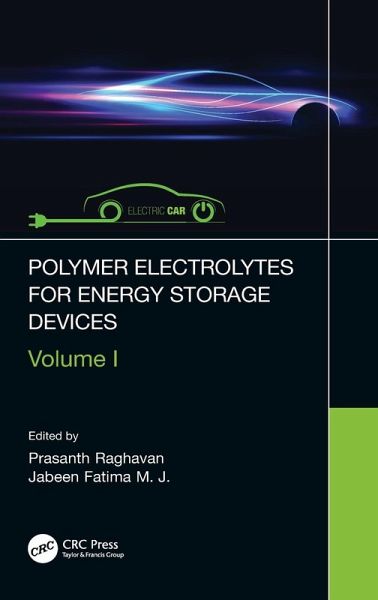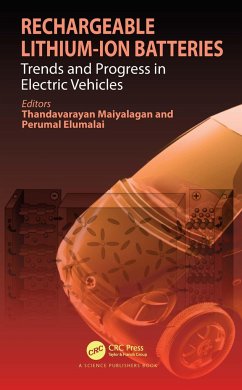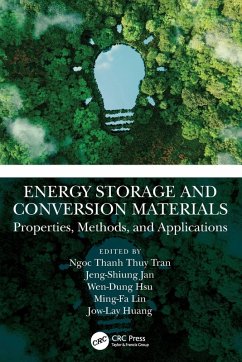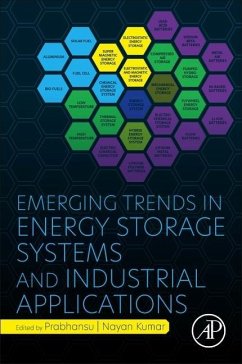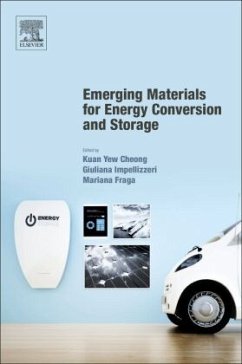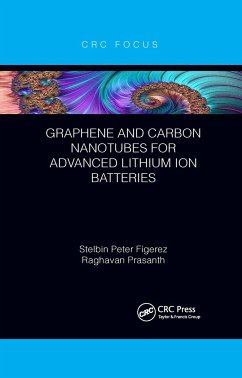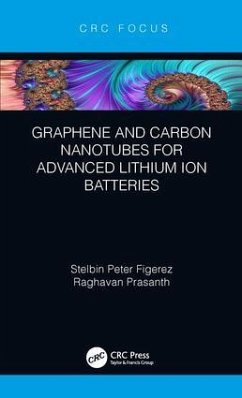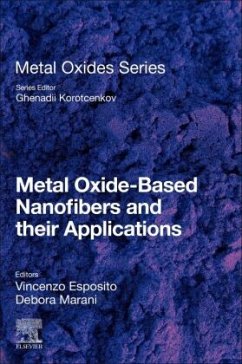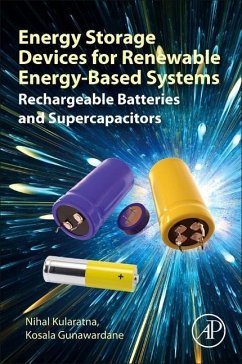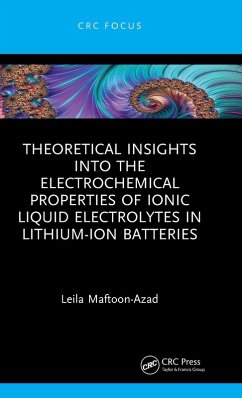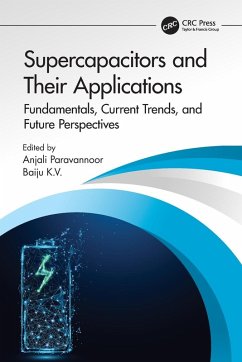Gebundenes Buch
Polymer Electrolytes for Energy Storage Devices
Versandkostenfrei!
Versandfertig in 1-2 Wochen
Weitere Ausgaben:

PAYBACK Punkte
84 °P sammeln!




Polymer Electrolytes for Energy Storage Devices offers a detailed explanation of recent progress and challenges in polymer electrolyte research for energy storage devices. The influence of these electrolyte properties on the performance of different energy storage devices is discussed in detail.
Dr. Prasanth Raghavan, Professor, at Department of Polymer Science and Rubber Technology, Cochin University of Science and Technology (CUSAT), and Visiting Professor at Department of Materials Engineering and Convergence Technology, Gyeongsang National University, Republic of Korea. He received his PhD in Engineering under the guidance of Prof. Jou-Hyeon Ahn, from Department of Chemical and Biological Engineering, Geyongsang National University, Republic of Korea, in 2009, under prestigious Brain Korea (BK21) Fellowship. He completed his B.Tech and M.Tech from CUSAT, India. After a couple of years of attachment stint as Project Scientist at Indian Institute of Technology (IIT-D), New Delhi, he moved to abroad for his PhD studies in 2007. His PhD research was focused on fabrication and investigation of nanoscale fibrous electrolytes for high performance energy storage devices. He completed his Engineering doctoral degree in less than three years and still it's an unbroken record in Republic of Korea. After the PhD, Dr. Prasanth joined as Research Scientist at Nanyang Technological University (NTU), Singapore in collaboration with Energy Research Institute at NTU (ERI@N) and TUM CREATE, a joint electromobility research centre between Germany's Technische Universität München (TUM) and NTU, where he was working with Prof. Rachid Yazami, the one who has successfully introduced graphitic carbon as anode for commercial lithium ion batteries, and received Draper Prize along with the Nobel Laurates Prof. J. B. Goodenough and Prof. Akira Yoshino. After four years in Singapore, Dr. Prasanth moved to Rice University, USA as Research Scientist where he was working with Prof. Pulickal M Ajayan, the co-inventor of Carbon Nanotubes, and lucky to work with 2019 Chemistry Nobel laurate Prof. J. B. Goodenough. Dr. Prasanth was selected for Brain Korea Fellowship (2007), SAGE Research Foundation Fellowship, Brazil (2009), Estonian Science Foundation Fellowship, European Science Foundation Fellowship (2010), Faculty Recharge, UGC (2015) etc. He received many international awards including Young Scientist award, Korean Electrochemical Society (2009), selected for Bharat Vikas Yuva Ratna Award, (2016) etc. He developed many products such as high performance breaking parachute, flex wheels for space shuttles, high performance lithium ion batteries for leading portable electronic device and automobile industries etc. He has a general research interest in polymer synthesis and processing, nanomaterials, green/nanocomposites, and electrospinning. His current research focused on nanoscale materials and polymer composites for printed and light weight charge storage solutions including high temperature supercapacitors and batteries. He have published a good number of research papers and book/book chapters in high impact factor journals and have more than 5000 citation and h-index of 45 plus. Apart from science and technology, Dr. Prasanth is a poet, activist and a columnist in online portals and printed media. Dr. Jabeen Fatima M. J is a research scientist at Materials Science and NanoEngineering Lab (MSNE Lab), Department of Polymer Science and Rubber Technology (PSRT), Cochin University of Science and Technology (CUSAT), India. Before joining MSNE Lab, she was working as a tentative Assistant Professor at Department of NanoScience and Technology, University of Calicut, India. She received her Ph.D in Nanoscience and Technology from University of Calicut in 2016, India, with prestigious National Fellowship JRF/SRF from Council of Scientific and Industrial Research (CSIR), under Ministry of Science and Technology, Government of India. Her research area was focused on synthesis of nanostructures for photoelectrodes for photovoltaic applications, energy storage devices, photoelectrochemical water splitting, catalysis etc. She received her MS degree in Applied Chemistry (University First Rank) after receiving her B.Sc degree in Chemistry from Mahatma Gandhi University (MGU), Kottayam, India. She received many prestigious fellowships like Junior/Senior Research fellowship (JRF/SRF) from Centre for Science and Research, Department of Science and Technology, Ministry of India, Post-doctoral/research scientist fellowship from Kerala State Council for Science, Technology and Environment (KSCSTE), InSc research excellence award, etc. She has published a good number of full length research articles in peer reviewed international journals and book chapters with international publishers. She is serving as reviewer for many STM journals publishing by Wiley International, Elsevier, Springer Nature etc. Her current area of interest includes the development of flexible and free standing electrodes for printable and stretchable energy storage solutions and development of novel nanostructured materials and ternary composite electrodes and electrolytes for sustainable energy applications like super capacitors, fuel cells and lithium ion batteries.
Produktdetails
- Verlag: Taylor & Francis Ltd
- Seitenzahl: 304
- Erscheinungstermin: 24. März 2021
- Englisch
- Abmessung: 240mm x 161mm x 21mm
- Gewicht: 602g
- ISBN-13: 9780367701451
- ISBN-10: 0367701456
- Artikelnr.: 60604236
Herstellerkennzeichnung
Libri GmbH
Europaallee 1
36244 Bad Hersfeld
gpsr@libri.de
Für dieses Produkt wurde noch keine Bewertung abgegeben. Wir würden uns sehr freuen, wenn du die erste Bewertung schreibst!
Eine Bewertung schreiben
Eine Bewertung schreiben
Andere Kunden interessierten sich für



